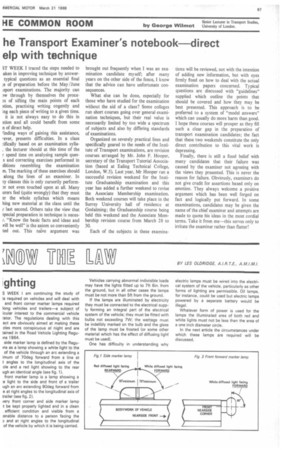he Transport Examiner's notebook elp with technique
Page 69

If you've noticed an error in this article please click here to report it so we can fix it.
3T WEEK I traced the steps needed to aken in improving technique by answertypical questions as an essential final ;e of preparation before the May /June ,sport examinations, The majority can pw through by themselves the proce m of sifting the main points of each stion, practising writing cogently and mg each piece of writing to a given time. it is not always easy to do this in ation and all could benefit from some n of direct help.
■ inding ways of gaining this assistance, 'ever, presents difficulties. In a class ifically based on an examination sylla, the lecturer should at this time of the
r spend time on analysing sample gues s and correcting exercises performed in ditions resembling the examination m. The marking of these exercises should along the lines of an examiner. In ty classes this is only cursorily perform)r not even touched upon at all. Many urers feel (quite wrongly) that they must Cr the whole syllabus which means [ling new material at the class until the e last second. Others take the view that special preparation in technique is necesr. "Know the basic facts and ideas and will be well" is the axiom so conveniently ted out. This naive argument was
brought out frequently when I was an examination candidate myself; after many years on the other side of the fence, I know that the advice can have unfortunate consequences.
What else can be done, especially for those who have studied for the examination without the aid of a class? Some colleges run short courses going over general examination techniques, but their real value is necessarily limited by too wide a spectrum of subjects and also by differing standards of examinations.
Organized on severely practical lines and specifically geared to the needs of the Institute of Transport examinations, are revision courses arranged by Mr. John F. Hooper, secretary of the Transport Tutorial Association (based at Ealing Technical College, London, W.5). Last year, Mr Hooper ran a successful revision weekend for the Institute Graduateship examination and this year has added a further weekend to revise the Associate Membership examination. Both weekend courses will take place in the Surrey University hall of residence at Godahning; the Graduateship course being held this weekend and the Associate Membership revision course from March 28 to 30.
Each of the subjects in these examina Lions will be reviewed, not with the intention of adding new information, but with eyes firmly fixed on how to deal with the actual examination papers concerned. Typical questions are discussed with "guidelines" supplied which outline the points that should be covered and how they may be best presented. This approach is to be preferred to a system of "model answers" which can usually do more harm than good. I hope these courses will prosper as they fill such a clear gap in the preparation of transport examination candidates; the fact that these two weekends constitute the only direct contribution to this vital work is depressing.
Finally, there is still a fixed belief with many candidates that their failure was caused by the examiner not agreeing with the views they presented. This is never the reason for failure. Obviously, examiners do not give credit for assertions based only on emotion. They always welcome a positive argument which has been well forged on fact and logically put forward. In some examinations, candidates may be given the name of the chief examiner and attempts are made to quote his ideas in the most cordial terms. Take it from me—this serves only to irritate the examiner rather than flatter!
























































































































